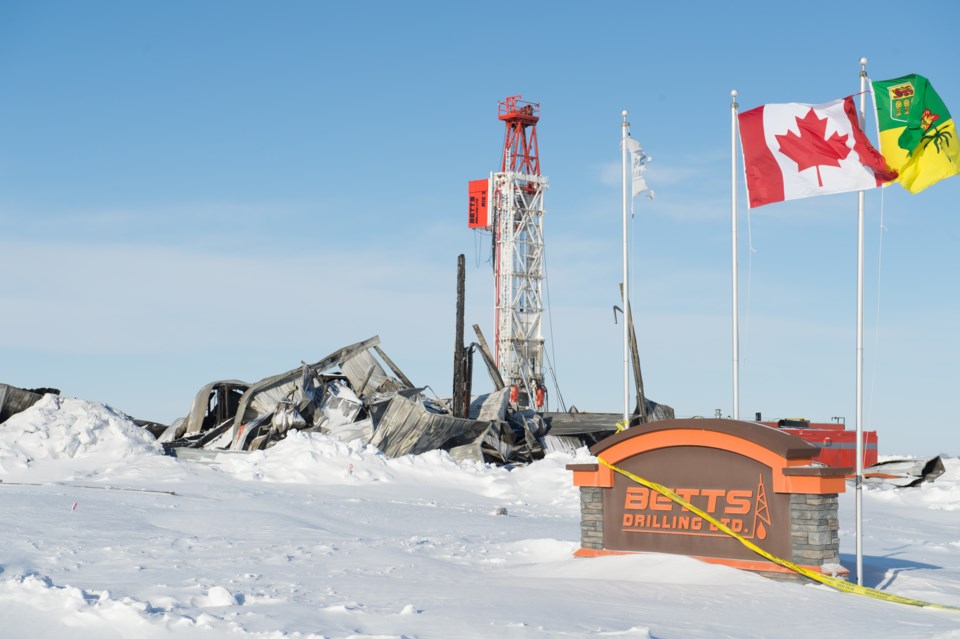Carnduff – Just after midnight, in the early minutes of Dec. 30, Betts Drilling shop and office on the east side of Carnduff burnt to the ground.
“They’re still doing the investigation,” said Bob Betts, general manager, on Jan. 10, who added indications were it was a gas leak resulting in an explosion.
The fire happened right after midnight – about 12:02 a.m. “Somebody driving by saw it. We found out through social media,” Betts said. “Our daughter contacted us by texting. Someone had called 911. We headed out the door and got there by 2 o’clock.”
Having recently moved from their farm south of Carnduff to their place at the lake, Bob and his wife Anne were at their home in southwest Manitoba, and hour-and-a-half drive away, at the time.
The primary purpose of the shop was to keep equipment warm and ready to go. With the Christmas drilling shutdown, it had a lot of iron in it.
“All our loaders, spare equipment for the rigs, were in there. All our spare parts, BOPS. That’s what the shop was for, so it’s ready to go. We had a gen set and a quarter-million-dollar floor motor.”
Three loaders were burnt in the fire, crucial equipment when the rigs are working. And, fortunately enough, the company had three rigs lined up to go to work a few days later on Jan. 4, and their fourth by Jan. 15. Three of those rigs were racked in the yard at the time of the fire, with a fourth at Stoughton.
As a result, they needed loaders right away. They were able to rent two off of Red Dog Drilling to tide them over.
Their toolpush shacks were lined up near the shop, plugged in. Betts said, “The fire department did a great job protecting the outbuildings. The push shacks were 20 feet away, each with a lot of parts.”
With their office burnt down, and work firing up, they needed an office right away. Friends Greg and Paulette Cousins got them set up in their vacant former office for Site Energy/Greg Cousins Construction Ltd., in town. That also provided a small shop, too.
“They’re good friends of ours,” Betts said of the Cousins. “They knew we needed a shop and office. They offered it to us right away. We jumped right on it.”
Bob ended up digging up an old behemoth of a laptop to run on his desk. Anne was making do with a tablet.
“Everything’s insured. We’re fine, that way,” he said, but they will take a deductible hit. They will likely rebuild in the same place, but it’ll probably be a year before they are in the new building.
The fortunate thing is that for the first time in almost two years, they had work lined up for all four rigs; a hundred-per cent utilization until breakup. That’s a big improvement from the 50 per cent utilization they had been seeing for much of the downturn.
Those four rigs are each working for a different oil companies, three smaller ones and one larger one.
“We’re kind of booked until road bans,” he said.
“I think people are looking for a stable oil price that’s not going to go to US$30. Fifty to US$35 scares a lot of companies away.”
Oilfield service companies dramatically cut their rates when the downturn hit. On that front, Betts said, “I think everybody’s still in survival mode. We’ve lots a lot of people in the oilfield to other jobs. We had to match CAODC wages to stay competitive.”
Their wages had been at a discount to the posted Canadian Association of Oilwell Drilling Contractor rates.
That said, with four rigs spooled up, they were able to find enough hands to man all the rigs. “I have no idea how it happened. It happened at the last minute. We found 84 guys to crew four rigs in January.”
Betts noted that rig hands prefer working on a rig that has steady work, as opposed to just one or two holes.
“We are really fortunate a lot of our guys are staying pretty loyal,” he said. However, some workers have gone farming, some have found jobs outside of the oilpatch. Some aren’t coming back.
So while the winter drilling season looks like it will be busy, Betts expects it might be a while to get back in the field once the snow is gone, given the high amounts of snow the region has seen this winter. “I think it’s going to be a long, nasty breakup,” he said, adding there could be some demand for drilling as companies seek to make up for production lost due to natural declines.



